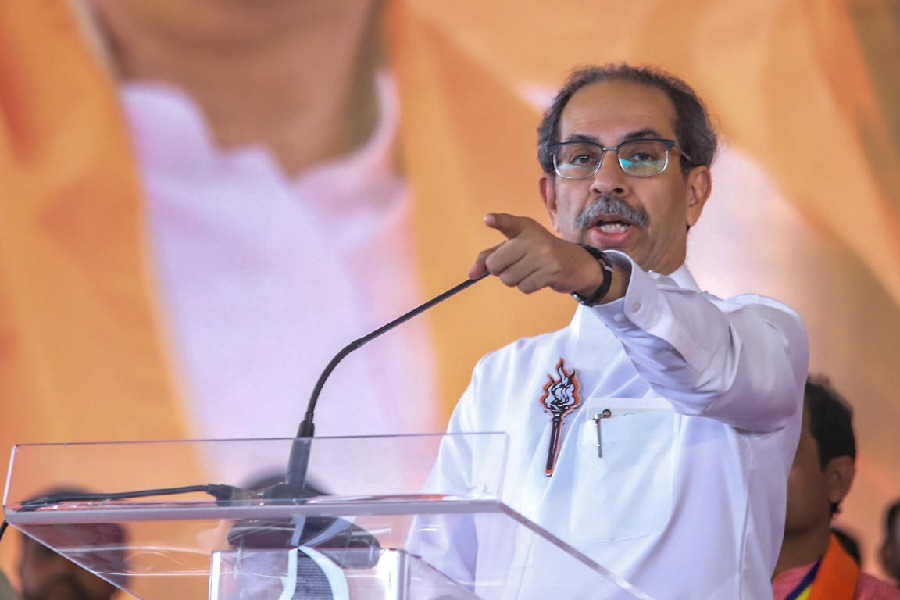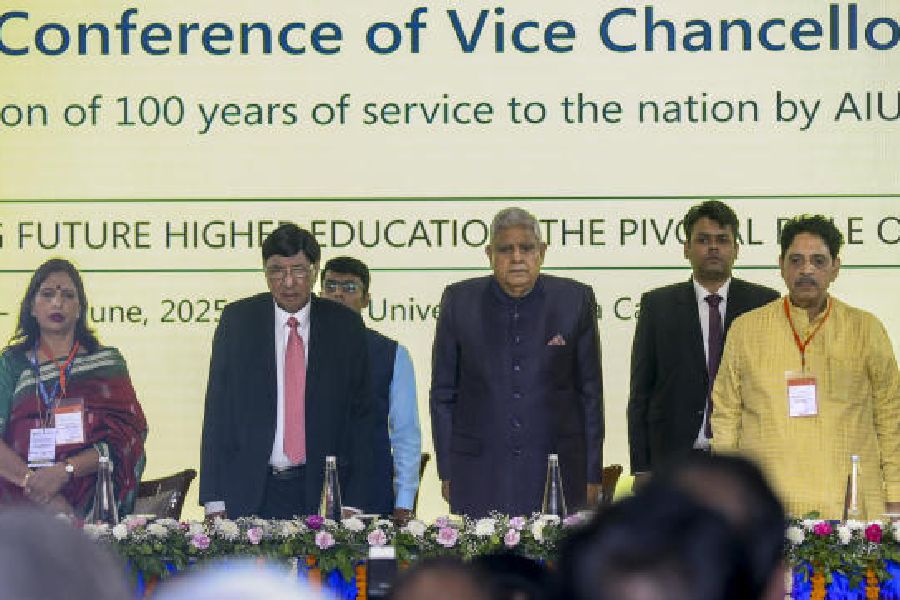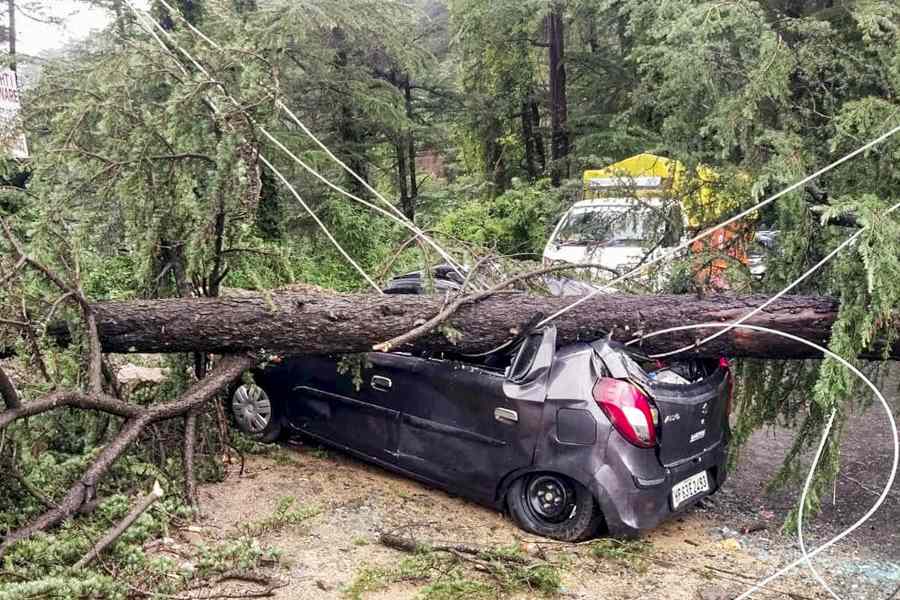 |
| The common man caught in the political crossfire while the Tatas say bye-bye — artist Anirban Ghosh, a third-year student of St Xavier’s College While the other states are racing ahead on the path of progress, Bengal seems determined to go the other way — artist Antara Dey, a student of Class XII of Mansur Habibullah Memorial School |
 |
Dream grows distant
It is very sad to see a company like the Tatas leave Singur. As a boy who has grown up in Calcutta, I have always wanted to see the city develop into one of the foremost in the country, if not the world. What is painful is that the city and the state of Bengal have all the resources to achieve this.
But politics in Bengal has been an impediment to development, rather than a facilitator. In the middle of the last century, almost all of the leading business houses came from Bengal. Today, barring a few, most have been pushed back into obscurity. The anti-industry environment in the state must be blamed for that.
This is the only state that can boast of having “state-sponsored” strikes at the drop of a hat. The chief minister has to apologise for daring to voice an opinion against the same. The Opposition resorts to the same strategy of strikes for everything.
Singur is just another example of a missed opportunity. Today, when most states seem to be clamouring for such investments, we have let one of the biggest projects in the past decade leave us because we could not resolve our disputes in a mature manner. The Nano project could have given a fresh lease of life to industrialisation in the state.
This incident will definitely leave a bad taste in the mouths of people who are thinking of investing in the state. I am not sure if this has even served the people of Singur well. They have lost a chance to become an industrial hub and gain access to thousands of jobs that would have been created.
As a management student from Calcutta, it pains me when I see that almost all the big names in industry have their offices in New Delhi, Mumbai and Bangalore but none in Calcutta. What it translates into for most young people like me is that we have to relocate to these cities leaving our families behind.
It is still a dream for me to see the big names of industry setting up their offices here. I guess the dream will not be a reality anytime soon.
Harsh Vardhan Chhaparia
IInd year, IIM Joka
The loss is ours
Bengal has been in the doldrums for so long. There are hardly any core industries here worth talking about other than the power plants. As an IIT graduate I would certainly not want to work in a software company. I cannot think of any company here where I can work once I graduate.
Last year, when we heard the Tatas would set up a new factory here we were extremely excited. They would obviously come to us for campus recruitment, we thought. Anyone would like to work in a place close to home. Who wants to come home only for two-three weeks in a year?
The Nano would have provided employment to so many of my friends. Why my friends? Laymen might think a car plant requires only automobile and mechanical engineers. But one of the biggest fields where microprocessors are used is the automobile industry. So even I could have been working there.
If the Nano did roll out of Bengal, it would have set a global benchmark for the state as the makers of the most inexpensive car in the world. It would have triggered something. In fact, just the Tatas coming in was a big enough event, something that has not happened in Bengal in a long time. Now even that ray of hope has been snuffed out.
We pass by agricultural fields when we travel to Kharagpur. I do appreciate the emotional attachment that a farmer has with his land. But the kind of benefit that a land yields is uncertain. In comparison, industry ensures round-the-year stable income. Without industrialisation, no state can progress.
The kind of politics played here is to blame for the present situation. If one party calls a bandh the other immediately responds in kind. Bengal is clutching on to the same mindset that prevailed when politicians opposed computerisation and automation fearing it would eat up jobs.
Pulling out of Bengal would not really affect the Tatas. They would get offers from many other states. The loss is all ours.
Arnab Sengupta
IIIrd year,IIT Kharagpur
Unmade in Bengal
Nano, Tata’s historic little car, had chosen Bengal as its birthplace. But that is not to be.
Thanks to political power play and the alleged tussle between agriculture and industry, the citizens of Bengal are the losers, especially the young, who just might have been cheated of a new era.
Bengal has been in an industrial coma for over 20 years. The advent of the Tata car plant brought with it the hope of economic revival and opportunity for employment, while at the same time placing Bengal on the international manufacturing map. The withdrawal will make Bengal a highly dubious industrial destination.
The commitment of the Tatas had brought immense pride and a sense of hope to today’s youth. Bengal would finally be able to compete in the same bandwidth alongside Maharashtra, Gujarat and Delhi, we had thought.
There are a large number of successful Bengalis all over the world. A lack of opportunity within the state had forced this migration. Could a new lease of industrialisation have brought opportunity to fresh graduates preventing this drain?
And it is not a city versus village debate as it is often made out to be. The urban youth still has many more options of mobility and employment. It is the rural youth that will really bear the brunt of this pullout.
But even as we are enveloped in disappointment today, I refuse to believe that Bengal will cease to have a future and that this was our last chance. We have to forge a path where industry and agriculture can co-exist. A partnership in which the stakeholders representing both sides create change that is not at the expense of the other.
Ahona Palchoudhuri
Class XILa Martiniere for Girls
What impact will the Tata pullout have on the youth of Bengal?
Tell ttmetro@abpmail.com











